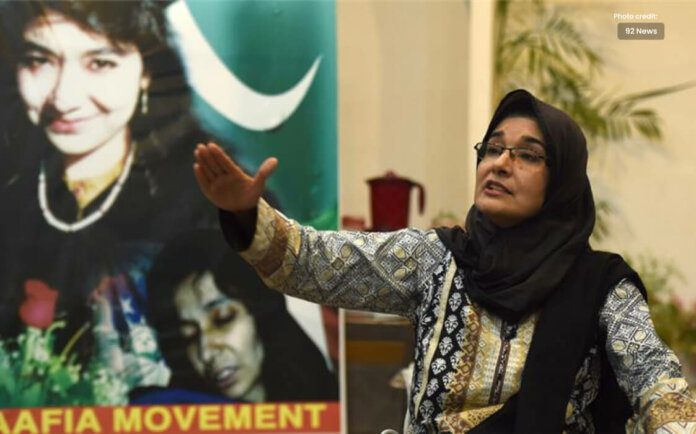Fawzia Siddiqui and Aafia Siddiqui reunite after two decades in jail.
Clive Stafford Smith, a human rights attorney who recently assisted in the release of two Pakistanis from Guantanamo Bay, joined Fawzia. Smith previously had a jail encounter with Dr. Aafia Siddiqui.
The sisters could only see each other via a glass pane during the intensely private rendezvous, which was held under tight security.
Senator Mushtaq described the encounter, which took place after a long interval of 20 years and lasted more than two hours.
کل ڈاکٹرعافیہ سےمیری ڈاکٹرفوزیہ اورکلائیو اسٹافورڈاسمتھ سمیت جیل میں ملاقات ہوگی۔
لیکن آج ڈاکٹرفوزیہ کی ملاقات کاافسوسناک احوال سن لیجیے۔اگر چہ صورتحال تشویشناک ہے لیکن ملاقاتوں کابات چیت کاراستہ کھل گیا۔اب ضرورت اس بات کی ہےکہ عوام آوازاٹھائیں اورحکمرانوں کومجبورکرےکہ وہ فوری…— Senator Mushtaq Ahmad Khan | سینیٹر مشتاق احمد خان (@SenatorMushtaq) May 30, 2023
Dr. Fawzia was not permitted to touch her sister or show her images of Dr. Afia’s kids during the meeting, though.
The sisters were kept in a room divided from them by a substantial glass wall. Dr. Afia was shown by Dr. Fawzia as donning a white scarf and a beige prison outfit.
Dr. Fawzia went on to express her worries about D Afia’s condition, noting that it took her sister over an hour to describe the difficulties she had been facing every day.
Unaware that their mother had died over a year earlier, Afia stated her desire to see her mother and children.
Unsettlingly, Fawzia revealed that Dr. Afia had suffered hearing loss owing to a scar on her skull and had lost her front teeth as a result of an alleged assassination attempt within the jail.
According to reports, Dr. Afia may have been tortured with a variety of methods in order to get her to provide information about which she was ignorant.
Dr. Aafia, who is she?
Pakistani scientist Aafia Siddiqui was convicted in 2010 of attempting to kill and harm American servicemen in Afghanistan. She was given an 86-year jail term.
She insisted on being innocent, and the case generated a lot of discussion.
In 1972, Aafia Siddiqui was created in Karachi, Pakistan.
She received her degrees in the early 1990s after completing her studies in biochemistry at the University of Karachi and neuroscience at Brandeis University.
At the University of Massachusetts Medical School, she later earned a Ph.D. in neuroscience, which she finished in 2001.
She returned to Pakistan after completing her studies and took a position as a neuroscientist at the Aga Khan University Hospital.
Along with these activities, she participated in humanitarian work, working with groups like the World Health Organisation (WHO) and the United Nations Children’s Fund.
Siddiqui was detained by Pakistani officials in 2003 on suspicion of having ties to al-Qaeda. She was placed under house arrest even though she was released a few months later.
Then, in 2008, she vanished from her Karachi home.
In 2009, Aafia Siddiqui returned to Afghanistan and was later captured by US soldiers in the region of Ghazni.
She was accused of trying to kill someone and assaulting American military troops. She was returned to the United States by extradition in August 2009.
She was found guilty two months after the trial started in January 2010.
She received an 86-year jail term from the court.
Aafia Siddiqui insisted on her innocence and filed an appeal after the trial.
She is presently completing her term of imprisonment at the Federal Medical Centre in Carswell, Texas. In 2033, she will be eligible for parole.




